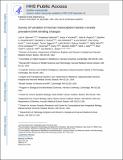Survey of variation in human transcription factors reveals prevalent DNA binding changes
Author(s)
Vedenko, A.; Kurland, J. V.; Rogers, J. M.; Gisselbrecht, S. S.; Woodard, J.; Mariani, L.; Kock, K. H.; Inukai, S.; Siggers, T.; Shokri, L.; Gordan, R.; Sahni, N.; Cotsapas, C.; Hao, T.; Yi, S.; Vidal, M.; Hill, D. E.; Barrera, Luis Alberto; Rossin, Elizabeth; Kellis, Manolis; Daly, Mark J.; Bulyk, Martha L.; ... Show more Show less
DownloadKellis_Survey of variation.pdf (1.594Mb)
OPEN_ACCESS_POLICY
Open Access Policy
Creative Commons Attribution-Noncommercial-Share Alike
Terms of use
Metadata
Show full item recordAbstract
Sequencing of exomes and genomes has revealed abundant genetic variation affecting the coding sequences of human transcription factors (TFs), but the consequences of such variation remain largely unexplored. We developed a computational, structure-based approach to evaluate TF variants for their impact on DNA binding activity and used universal protein-binding microarrays to assay sequence-specific DNA binding activity across 41 reference and 117 variant alleles found in individuals of diverse ancestries and families with Mendelian diseases. We found 77 variants in 28 genes that affect DNA binding affinity or specificity and identified thousands of rare alleles likely to alter the DNA binding activity of human sequence-specific TFs. Our results suggest that most individuals have unique repertoires of TF DNA binding activities, which may contribute to phenotypic variation.
Date issued
2016-03Department
Massachusetts Institute of Technology. Institute for Medical Engineering & Science; Broad Institute of MIT and Harvard; Harvard University--MIT Division of Health Sciences and Technology; Massachusetts Institute of Technology. Computer Science and Artificial Intelligence LaboratoryJournal
Science
Publisher
American Association for the Advancement of Science (AAAS)
Citation
Barrera, L. A. et al. “Survey of Variation in Human Transcription Factors Reveals Prevalent DNA Binding Changes.” Science 351, 6280 (March 2016): 1450–1454. © 2016 American Association for the Advancement of Science (AAAS)
Version: Author's final manuscript
ISSN
0036-8075
1095-9203